I'm very glad to be doing the Smackdown over at Stinkylulu. Check it out when you have moment. I'm working on making this blog more about film writings, and the other place I post, Live Journal more personal. For the most part I'm posting over there, but trying to do some more writings here. A balance will be struck, I would imagine.
Meanwhile, thanks for visiting, and here's a little capsule about Pan's Labyrinth:
Well, we were not prepared for that. If I were a more florid reviewer I would say something like "Del Toro's vision, shocking and beatiful, has the power to pry open your heart little by little until you are left with no defenses. As much a fairy tale as a vision of heroism, sacrifice, rebellion and loss." But I'm not, so this looks like a terrible, beatiful, and ultimately harrowing view of life and sacrifice under fascism, as well as a simple fairy tale quest. I went with someone I was meeting for the first time, and during the credits all I could think was how to have a moment for myself, because this person didn't seem like someone I'd want to be that open near. Shocking for me because there is so much violence, and truly disturbing, but it may be my favorite movie of the year so far.
A place to sound off about movies, books, and politics, and the culture at large, and let's face it, whatever I feel like.
Sunday, December 31, 2006
Wednesday, September 13, 2006
9/11
I wrote this for a post on my other blog, which I seem to be writing more in lately--it's a bit more personal. I'm not sure if anyone reads this, but I'll go ahead and post this here as well, anyway.
Okay. Here goes.
Sept 10th I returned from a vacation that was cataclysmic for me. I went to my first radical faerie gathering with my friend Jon. I had met Jon at a dinner hosted by a friend Damon who had recently graduated undergrad at Brown. Damon and I had met when he was 18 and I was 28. There was a mutual attraction, but I wasn’t going there. 4 years later he had been rowing crew for four years, 6’2 black hair and green eyes, and was just stunning. And OUT OF THE CLOSET!! So he had a very gay dinner party. Jon walked in with Birkenstocks, a beard, and cotton drawstring pants. We hit it off. I dress preppy-ish, but I’m really a hippie. Neither of us had been to a gathering, so we went, camped out, and hung out in a field for ten days. It was amazing. And there I met a man, David, who I would end up dating for a year—eventually leaving NY and moving up to Vermont for. But that’s in the future at the moment. Monday night I meet one of the guys I met at the faerie gathering, Mo, for a screening of Funny Girl at the Ziegfeld. Mo, an actor and a great big ham, tells me stories of seeing the movie in London in 1964.
Sept 11 was my first day back at work. The sky was beautiful, clear, and I was carrying great memories of the weekend, heading back to my job at the investment bank. I had been working there for about three years at that point. I had worked all over downtown with Tiger Temps, a temp company that used artists, performers, etc. I had worked at 3 WFC for about a year and a half. We had a satellite of the group I managed at One Liberty, but I was heading to the main office down from the stock exchange. I think I had my walkman on. Or maybe not, as I remember someone asking around as soon as I got off the subway “Did you just hear that boom?” I didn’t. I kept walking. I was heading South on William. I looked to my right where the building cover opened to reveal the trade centers, and I saw smoke, then fire coming out of one of the towers. I stood and looked at it for a couple of minutes. “Hmm,” I thought, “The World Trade Center is on fire. Someone will take care of it.” I turned to walk to work. Some random bits of paper and flotsam started falling on my head, and you could smell the burn. I heard a woman scream and start to freak out. There was a cop directing traffic. “I don’t know what the big deal is,” I thought, “I’m just going to get my coffee and breakfast.” It sounds weird, but I actually thought those words. And then I went and got coffee and breakfast.
When I arrived at work, everyone was watching on the TV screen. We were about 16 stories up and near the water on Broad. We couldn’t see the trade center. We were all watching footage of a few blocks away. Then the second plane hit. Everyone ran downstairs and out the door. We all converged outside of the building. The man we had hired as the permanent manager said “We should be inside answering phones. They said it was safe.” I mentioned that as two planes just flew into tall buildings a few blocks away, and that we were in a 30 story building completely open to the air on one side, perhaps people wouldn’t feel all that safe. And who was calling in for computer questions right now? I can see now he was trying to gain some control, but at the time it just seemed idiotic and insensitive. We all eventually were ushered back in, as there was nowhere else to go—it’s not like we could head north. Inside people were freaking out. A woman from the agency we all worked with burst into tears with her father on the phone. I remember thinking she was in a leadership position, and should hold it together better. Nice, huh? One of our co-workers lived on Staten Island and was 7 months pregnant. Her husband taught pre-school at a site near the WTC. He had the forethought to get his entire class out and to safety. Everyone was answering email and cell phone calls, and finding out if everyone was safe, reassuring relatives. We also were watching the whole thing on TV. I remember looking out a window and seeing people in suits and office clothes running through the streets, looking for cover. We had a group in One Liberty. The police had told them to go back in the building, but luckily they left. One guy just went home, but the rest actually came to our building. It was lucky: the floor they were on had 8 inches of debris on the ground in some places, and all the windows shattered.
The first building collapsed and we couldn’t see out the windows. Everything was gray, like we were trapped in a big piece of lint. The second building collapsed and everything turned a deep shade of blue, almost black. The sun was blocked out, but it was the light coming through that turned the debris that color. It felt like being suspended in outerspace. The air wasn’t moving. I don’t remember most of the rest of the day at the office. I remembering David emailing from Vermont to make sure I was okay. We had to make sure the phones were covered, and since I was a manager I had to stay and make sure as well. It seemed like everyone wanted to be valiant, to be a hero in some way—like if we cover the phones we are being noble. It’s a good human impulse, but it was interesting watching people try to wrest as much control from an uncontrollable situation as they could. Having been to meetings about contingency plans, meetings about meetings, etc, this was one thing we had never covered. By the time the three of us could leave—my immediate boss, the consultant liaison, and me—there were no gas masks left. We wet papertowels and held them over our mouths as we walked outside. There was no wind. I can describe it no other way than to say it was like being in a sandstorm on the moon. Everything was covered in a white grey powder. I looked to my left at Wall Street and couldn’t see to Trinity church. There was a man in the street in what looked like an astronaut suit. It looked like he was walking on the moon. And there we were in our suits and ties, with papertowels over our mouths.
The smell was that awful acrid smell we would smell for months. Burning plastic, chemicals. When I first moved to LA I smelled that smell and it freaked me out. I looked over and saw a car burning in the street. It smells like that. After going back to work, sometimes the smell would suddenly infest the building as the wind had changed. We would all feel nauseated. People went home sick. We walked through it that Tuesday afternoon, emerging to light somewhere North of Fulton. As we walked past City Hall, there was a large group of people gathered around a construction site. There were hammers lying in the grass, and wood being used to shield construction was being ripped off, sawed in pieces and used to make stretchers. There was a flat bed truck full of them. Everyone wanted to help. We walked on; another guy who had left with us kept saying “this is just like that movie”. I didn’t know what he was talking about, and this was definitely not my kind of movie. Later, my guitar teacher told me that she felt a little guilty, but it actually looked beautiful from her buildling on W4th--beatiful and terrible, with the glints of the sun relected in the exploding glass, a glittering shower. Everything was cinematic.
We finally made it to the W4th station after walking for about 45 minutes. I got on a train going uptown looking down at my black shoes, covered in fine, white gray powder. A girl sat next to me saying how we shouldn’t be surprised. She was half Jewish and half Arab, and with the way we treated other countries we should be surprised that it didn’t happen earlier. I think I told her that that may be true, but perhaps this wasn’t the best time to explore those ideas. I really don’t remember what I said, but someone on the train thanked me for being patient, because they would’ve decked her. I guess she was making everyone tense. You could feel people breathe when she got off.
I lived up by the Cloisters, and I invited everyone I knew over. Peter and Matt from downstairs; Jon, who I mentioned before; Vivian; Roxy; another David from school; a friend of Viv’s. I made chicken soup for everyone and we watched funny videos, because we couldn’t bear anymore news. We just wanted to be with each other. And laugh.
We were off work for a week. My boss called to tell me that we would be back the following Tuesday. I said that perhaps some people might have a difficult time returning. “Why?” he asked. Um, maybe because something pretty fucking TRAUMATIC happened the last time they were at work?? Just amazing, that one. I had a hard time going back. I had a hard time accepting a tank and armed soldiers outside of the Starbucks. “Doesn’t it make you feel safer?” someone asked. No, it didn’t. Nor did I like the family wearing “9/11 never forget” T-shirts while walking around downtown either. The tourism of the whole thing really began to get upsetting. And now the nostalgia-izing. I think I still have that "lets' move on" attitude--that there is so much wrong and so much we need to work on in the world, let's not stew. But then, here I am still affected by it, I think. There are more flashes from that time—I remember going to group therapy; we couldn’t get past the barricade at 14th without being a resident, but there was a deli on 14th and 8th that had one door on each street. If you entered on 14th, you could exit on 8th and walk right past the police. Toward the burning buildings and into the therapist’s apartment where we all just sat kind of shell-shocked. People were kind, I remember, and we were all being polite. Everyone was in shock. New Yorkers get a bad rap anyway--they are usually friendly, just aggressively so. I don't think it was the friendliness that was different, I just think everyone was more vulnerable and the way it came across was gentler. I remember a VP thanking me for how great I was, and that I made her feel safer. I still have no idea what I did. I think I just didn’t break down. And I think after that I finally went on Zoloft. Which was helpful. I think I still don't believe it--that such a huge thing is gone. A daily thing--I would still catch myself saying, "Oh I'll just walk over to...oh no I won't. It's gone."
And I didn’t lose it when I went to my temp agency, and saw the list of 100 artists, actors, musicians, that were lost at Cantor Fitzgerald. Wall Street likes to use temps. And I guess I was lucky. My 4 year job started with a one day assignment to pass out stamps. I’m sure some actor got a call on Monday saying “Are you free tomorrow? I have a one day assignment at Cantor Fitzgerald. It’s on the 107th floor of the World Trade Center. Be there at 8:30”
Okay. Here goes.
Sept 10th I returned from a vacation that was cataclysmic for me. I went to my first radical faerie gathering with my friend Jon. I had met Jon at a dinner hosted by a friend Damon who had recently graduated undergrad at Brown. Damon and I had met when he was 18 and I was 28. There was a mutual attraction, but I wasn’t going there. 4 years later he had been rowing crew for four years, 6’2 black hair and green eyes, and was just stunning. And OUT OF THE CLOSET!! So he had a very gay dinner party. Jon walked in with Birkenstocks, a beard, and cotton drawstring pants. We hit it off. I dress preppy-ish, but I’m really a hippie. Neither of us had been to a gathering, so we went, camped out, and hung out in a field for ten days. It was amazing. And there I met a man, David, who I would end up dating for a year—eventually leaving NY and moving up to Vermont for. But that’s in the future at the moment. Monday night I meet one of the guys I met at the faerie gathering, Mo, for a screening of Funny Girl at the Ziegfeld. Mo, an actor and a great big ham, tells me stories of seeing the movie in London in 1964.
Sept 11 was my first day back at work. The sky was beautiful, clear, and I was carrying great memories of the weekend, heading back to my job at the investment bank. I had been working there for about three years at that point. I had worked all over downtown with Tiger Temps, a temp company that used artists, performers, etc. I had worked at 3 WFC for about a year and a half. We had a satellite of the group I managed at One Liberty, but I was heading to the main office down from the stock exchange. I think I had my walkman on. Or maybe not, as I remember someone asking around as soon as I got off the subway “Did you just hear that boom?” I didn’t. I kept walking. I was heading South on William. I looked to my right where the building cover opened to reveal the trade centers, and I saw smoke, then fire coming out of one of the towers. I stood and looked at it for a couple of minutes. “Hmm,” I thought, “The World Trade Center is on fire. Someone will take care of it.” I turned to walk to work. Some random bits of paper and flotsam started falling on my head, and you could smell the burn. I heard a woman scream and start to freak out. There was a cop directing traffic. “I don’t know what the big deal is,” I thought, “I’m just going to get my coffee and breakfast.” It sounds weird, but I actually thought those words. And then I went and got coffee and breakfast.
When I arrived at work, everyone was watching on the TV screen. We were about 16 stories up and near the water on Broad. We couldn’t see the trade center. We were all watching footage of a few blocks away. Then the second plane hit. Everyone ran downstairs and out the door. We all converged outside of the building. The man we had hired as the permanent manager said “We should be inside answering phones. They said it was safe.” I mentioned that as two planes just flew into tall buildings a few blocks away, and that we were in a 30 story building completely open to the air on one side, perhaps people wouldn’t feel all that safe. And who was calling in for computer questions right now? I can see now he was trying to gain some control, but at the time it just seemed idiotic and insensitive. We all eventually were ushered back in, as there was nowhere else to go—it’s not like we could head north. Inside people were freaking out. A woman from the agency we all worked with burst into tears with her father on the phone. I remember thinking she was in a leadership position, and should hold it together better. Nice, huh? One of our co-workers lived on Staten Island and was 7 months pregnant. Her husband taught pre-school at a site near the WTC. He had the forethought to get his entire class out and to safety. Everyone was answering email and cell phone calls, and finding out if everyone was safe, reassuring relatives. We also were watching the whole thing on TV. I remember looking out a window and seeing people in suits and office clothes running through the streets, looking for cover. We had a group in One Liberty. The police had told them to go back in the building, but luckily they left. One guy just went home, but the rest actually came to our building. It was lucky: the floor they were on had 8 inches of debris on the ground in some places, and all the windows shattered.
The first building collapsed and we couldn’t see out the windows. Everything was gray, like we were trapped in a big piece of lint. The second building collapsed and everything turned a deep shade of blue, almost black. The sun was blocked out, but it was the light coming through that turned the debris that color. It felt like being suspended in outerspace. The air wasn’t moving. I don’t remember most of the rest of the day at the office. I remembering David emailing from Vermont to make sure I was okay. We had to make sure the phones were covered, and since I was a manager I had to stay and make sure as well. It seemed like everyone wanted to be valiant, to be a hero in some way—like if we cover the phones we are being noble. It’s a good human impulse, but it was interesting watching people try to wrest as much control from an uncontrollable situation as they could. Having been to meetings about contingency plans, meetings about meetings, etc, this was one thing we had never covered. By the time the three of us could leave—my immediate boss, the consultant liaison, and me—there were no gas masks left. We wet papertowels and held them over our mouths as we walked outside. There was no wind. I can describe it no other way than to say it was like being in a sandstorm on the moon. Everything was covered in a white grey powder. I looked to my left at Wall Street and couldn’t see to Trinity church. There was a man in the street in what looked like an astronaut suit. It looked like he was walking on the moon. And there we were in our suits and ties, with papertowels over our mouths.
The smell was that awful acrid smell we would smell for months. Burning plastic, chemicals. When I first moved to LA I smelled that smell and it freaked me out. I looked over and saw a car burning in the street. It smells like that. After going back to work, sometimes the smell would suddenly infest the building as the wind had changed. We would all feel nauseated. People went home sick. We walked through it that Tuesday afternoon, emerging to light somewhere North of Fulton. As we walked past City Hall, there was a large group of people gathered around a construction site. There were hammers lying in the grass, and wood being used to shield construction was being ripped off, sawed in pieces and used to make stretchers. There was a flat bed truck full of them. Everyone wanted to help. We walked on; another guy who had left with us kept saying “this is just like that movie”. I didn’t know what he was talking about, and this was definitely not my kind of movie. Later, my guitar teacher told me that she felt a little guilty, but it actually looked beautiful from her buildling on W4th--beatiful and terrible, with the glints of the sun relected in the exploding glass, a glittering shower. Everything was cinematic.
We finally made it to the W4th station after walking for about 45 minutes. I got on a train going uptown looking down at my black shoes, covered in fine, white gray powder. A girl sat next to me saying how we shouldn’t be surprised. She was half Jewish and half Arab, and with the way we treated other countries we should be surprised that it didn’t happen earlier. I think I told her that that may be true, but perhaps this wasn’t the best time to explore those ideas. I really don’t remember what I said, but someone on the train thanked me for being patient, because they would’ve decked her. I guess she was making everyone tense. You could feel people breathe when she got off.
I lived up by the Cloisters, and I invited everyone I knew over. Peter and Matt from downstairs; Jon, who I mentioned before; Vivian; Roxy; another David from school; a friend of Viv’s. I made chicken soup for everyone and we watched funny videos, because we couldn’t bear anymore news. We just wanted to be with each other. And laugh.
We were off work for a week. My boss called to tell me that we would be back the following Tuesday. I said that perhaps some people might have a difficult time returning. “Why?” he asked. Um, maybe because something pretty fucking TRAUMATIC happened the last time they were at work?? Just amazing, that one. I had a hard time going back. I had a hard time accepting a tank and armed soldiers outside of the Starbucks. “Doesn’t it make you feel safer?” someone asked. No, it didn’t. Nor did I like the family wearing “9/11 never forget” T-shirts while walking around downtown either. The tourism of the whole thing really began to get upsetting. And now the nostalgia-izing. I think I still have that "lets' move on" attitude--that there is so much wrong and so much we need to work on in the world, let's not stew. But then, here I am still affected by it, I think. There are more flashes from that time—I remember going to group therapy; we couldn’t get past the barricade at 14th without being a resident, but there was a deli on 14th and 8th that had one door on each street. If you entered on 14th, you could exit on 8th and walk right past the police. Toward the burning buildings and into the therapist’s apartment where we all just sat kind of shell-shocked. People were kind, I remember, and we were all being polite. Everyone was in shock. New Yorkers get a bad rap anyway--they are usually friendly, just aggressively so. I don't think it was the friendliness that was different, I just think everyone was more vulnerable and the way it came across was gentler. I remember a VP thanking me for how great I was, and that I made her feel safer. I still have no idea what I did. I think I just didn’t break down. And I think after that I finally went on Zoloft. Which was helpful. I think I still don't believe it--that such a huge thing is gone. A daily thing--I would still catch myself saying, "Oh I'll just walk over to...oh no I won't. It's gone."
And I didn’t lose it when I went to my temp agency, and saw the list of 100 artists, actors, musicians, that were lost at Cantor Fitzgerald. Wall Street likes to use temps. And I guess I was lucky. My 4 year job started with a one day assignment to pass out stamps. I’m sure some actor got a call on Monday saying “Are you free tomorrow? I have a one day assignment at Cantor Fitzgerald. It’s on the 107th floor of the World Trade Center. Be there at 8:30”
Friday, June 23, 2006
The Downtown LA Theatre Tour
On my birthday, last Saturday, a bunch of us from GMCLA went on a tour of the Los Angeles Historic Theatre District sponsored by the LA Conservancy. One of the chorines, David duMars, is a docent and led the tour. I've taken some photos, and without being on snapfish or something, I figure this is the easiest way to share the photos, and to walk you through the afternoon. We started at million dollar theater on 3rd and Broadway. Fred Camerer, another chorine, shares my birthday. Here we are:
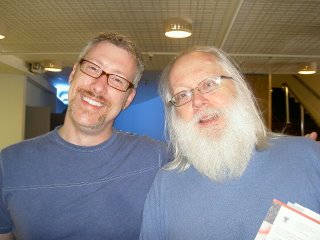
The lobby is built over 60's style, and has photos of Latin stars who performed or were in movies that showed there when it became a more Latin moviehouse.
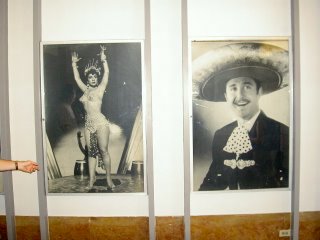
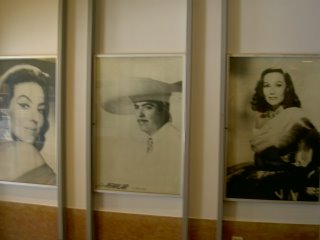
PierCarlo wanted in on the act:
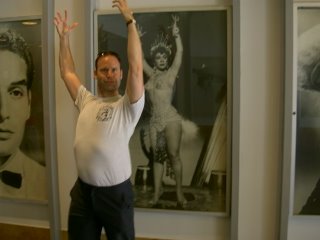
The theater itself was opened in 1918, and has a 110' freestanding balcony that was built of cement, as materials were in short supply. It was the first cement balcony of it's kind, and it was wieghed down with over a million pounds of sandbags to test its strength. There is a great organ grille as well that I tried to get a picture of, but I don' t think I was too successful. Here are pictures of the organ grille and the dressing rooms and rigging:
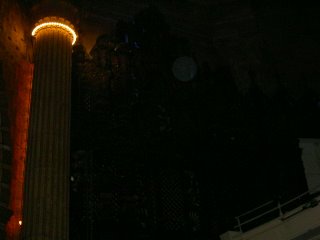

A note about the photos: some are dark, but I can see them much better on my MAC. And wierdly, as you will notice in the picture of the rigging, there are some with floating dots of different sizes. They are only in the photos of the theatres that had live performance, and really heavy in the older ones. I'll point them out as I go along. Ghosts?
I was excited at this point, as I knew we were going to see a lot of Antique Glamour:

And we also got the strange LA Gargoyle. A lute player on a bison. Why not?
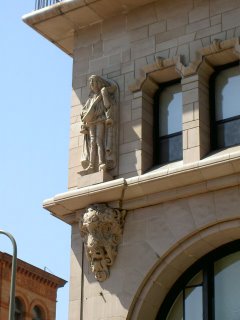
And so we were, whisked from the street, we were next headed to the Cameo
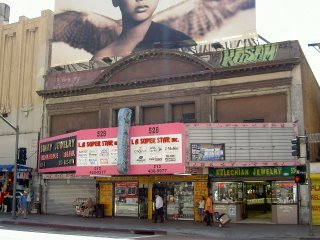
This theatre was also known as the Clunes Broadway. It was built in 1910, strictly as a movie house. It's very simple, and reminds you of movie houses you might go into anywhere in the country. The wldest thing was walking through an electronics store, and finding this behind it. It's their storage room. Notice that there are no little dots floating about in here.
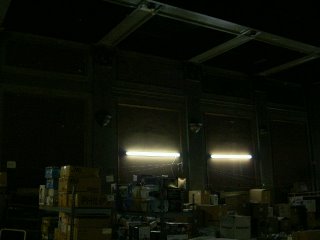

That's our guide in the yellow t-shirt. We didn't get to head into the Roxie, but I did get some pictures, and some of the terrazo inlays that are all over downtown:
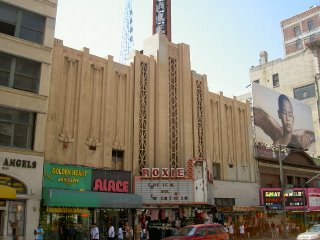
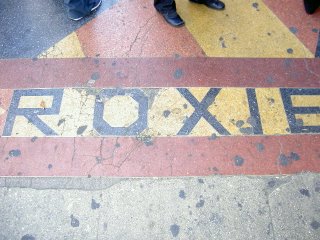
After this we went to the Pantages. You'll notice that the name was changed, but you can still see the Pantages sign above the new one. It was built in 1910, and the first headliner was Sophie Tucker.
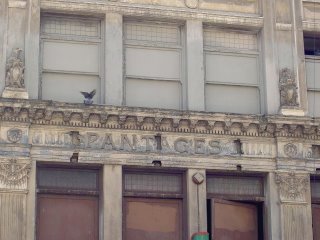
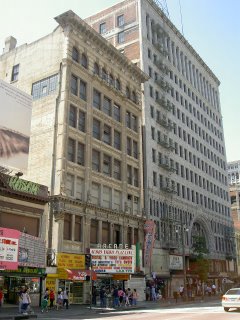
This is the theatre with the most floating dots. You'll see it especially in the picture of the balcony. The arch is pretty great, and it's spooky and fascinating to be in this one and look up at the flies. The rigging is still there, as it is in all of these. It's a little jewel box, and the acoustics are still great. The storage is on the orchestra floor, but the balcony is empty. This must have been a beautiful theatre. Somebody should do a production of "Follies" in one of these:
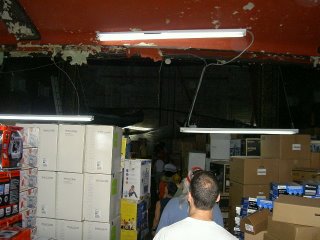
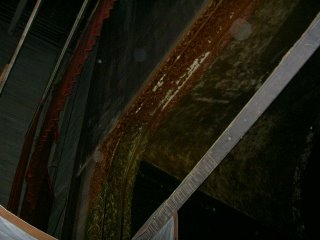
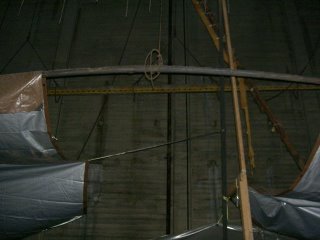

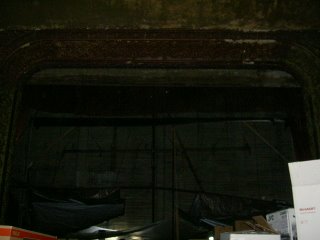
And here's that Balcony:
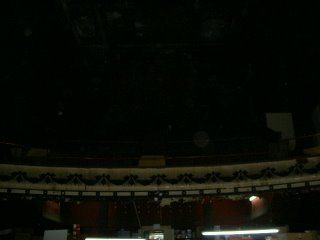
We walked on some more after this. The tour consists of six blocks on Broadway, and they're pretty wide blocks. Here are a couple of pictures of us walking. I think people are looking at a building, not Superman.

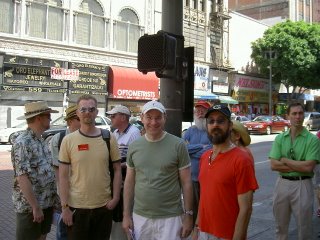
Next we walked on to take a look at the Los Angeles, where City Lights opened in 1931. The pictures we were shown of the inside are gorgeous. The man building it bankrupted himself. We were told it's in good condition, and there are still some screenings and shows that happen there. You can see how ornate it is outside. We then walked past the Tower, which looked amazing from the outside, and toward the Palace (which was the original Orpheum). We couldn't get in, but I got a great picture of the lobby.
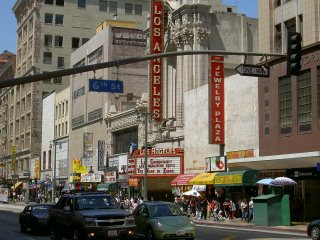
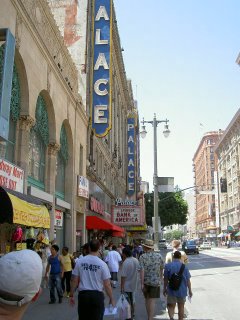
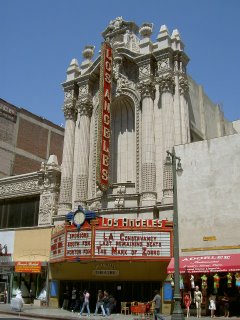
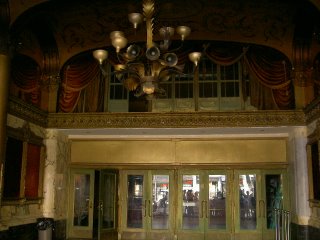
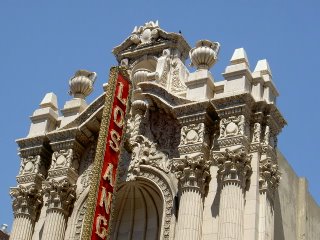

I guess no dots hang out in the lobby of the Palace. Our second to last, and longest tour spot was at the Orpheum, which was restored with private funds in 2001. It's beautiful, and we learned some interesting tidbits. When the American Idols go to Hollywood, they go to the Orpheum. It's got great balconies, a beautiful organ grille, grogeous fixtures, and a great donwstairs lobby with a fireplace, all below. This is where we asked the gentleman who has been in and around these theatres for about 60 years about ghosts. He said there used to be 5 in the Orpheum, but they haven't been heard of so much since renovation. He said they counted about 22 in the Pantages (see the dots above). There was still one wierd dot in one of the lobby photos, though. He said that a paranormal had been possessed by a nasty one when they were renovating. He also mentioned how dangerous theatres were, and that it was not uncommon for there to be accidental deaths, people falling, etc. So that was fun. The Orpheum is gorgeous, and they've done a great job. Two tidbits: the balcony curtains were white, but actually have turned the color they are from cigarette smoke. Ditto for the lobby marble. The yellowish color of the walls was there to match the marble, which was stained from smoke before it was cleaned in renovation. Here are some pics of the lobby, ticket booth, and lights:

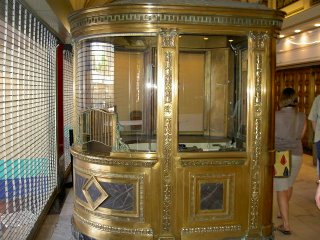
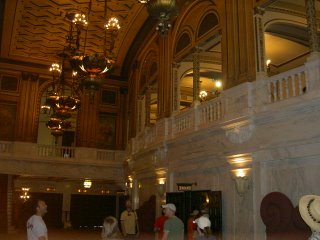
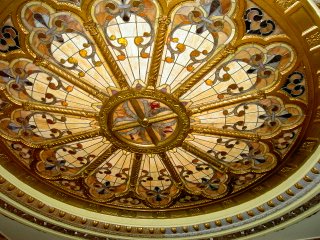
And some more of the interior:

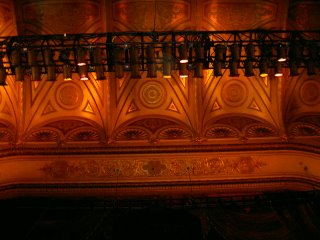
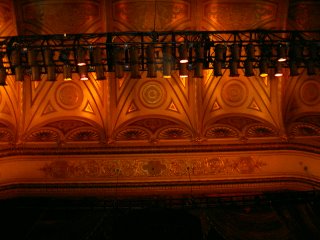
And finally, a nice seat on the couch in the restroom lobby, complete with fake fire for the sweltering summer day.
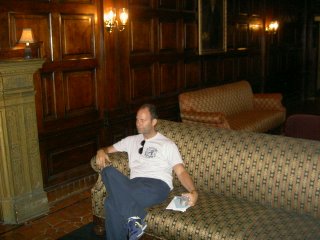
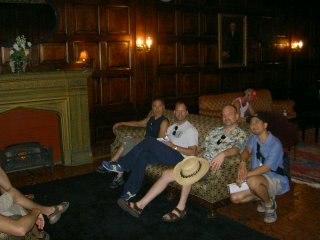
Here's where the camera ran out of batteries, so I didn't get a lot of people pictures in. Sad. But I took some photos on the way that I'll insert here, since our tour was not quite over. We ended up at the Warner Brothers theatre that's at 7th and Hill. It's now a diamond mart, but they've kept the arch, the exits, the balcony, etc. It's wild. Anyhow, here are the other pics. The first two are of an incredible Deco building called the Eastern something building on 8th or 9th and Bway. It's under renovation, but it's magnificent.
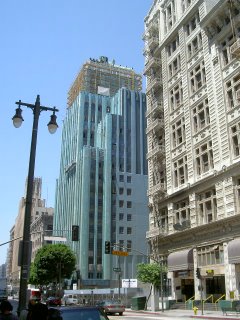

And some very aloof Angelinos
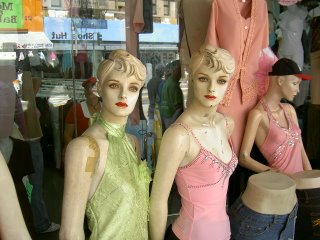
Who could not believe we were eating at
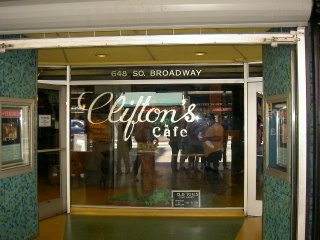
Clifton's! It was opened in 1935, and unfortunately the camera died before I could take pictures of the waterfall and taxidermy inside. I'm not kidding. Blond wood, let's go to Yellowstone theme, and great cafteria food. The usuals, as well as a chicken mole and things like that for the Mexican population that frequents it. Still reasonable. And I love cafterias. I had the beef with potato pancakes and gravy, with a salad and spinach. Followed by pudding, of course. And below, you'll see some of the terrazo medallions that are on the floor outside. Loved it. I'd go back.
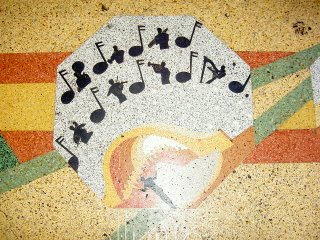



I love the prehistoric tarpits Sabbertooth tiger. So we were all sunburned and sated, and had a great time. Four of us went to see the Bradbury building on our way to our cars. It's an 1890's Belle Epoque gem. Who knew all this was still here? And thanks to the conservancy, it still is. Do it yourself some time. It's a great afternoon.


The lobby is built over 60's style, and has photos of Latin stars who performed or were in movies that showed there when it became a more Latin moviehouse.


PierCarlo wanted in on the act:

The theater itself was opened in 1918, and has a 110' freestanding balcony that was built of cement, as materials were in short supply. It was the first cement balcony of it's kind, and it was wieghed down with over a million pounds of sandbags to test its strength. There is a great organ grille as well that I tried to get a picture of, but I don' t think I was too successful. Here are pictures of the organ grille and the dressing rooms and rigging:


A note about the photos: some are dark, but I can see them much better on my MAC. And wierdly, as you will notice in the picture of the rigging, there are some with floating dots of different sizes. They are only in the photos of the theatres that had live performance, and really heavy in the older ones. I'll point them out as I go along. Ghosts?
I was excited at this point, as I knew we were going to see a lot of Antique Glamour:

And we also got the strange LA Gargoyle. A lute player on a bison. Why not?

And so we were, whisked from the street, we were next headed to the Cameo

This theatre was also known as the Clunes Broadway. It was built in 1910, strictly as a movie house. It's very simple, and reminds you of movie houses you might go into anywhere in the country. The wldest thing was walking through an electronics store, and finding this behind it. It's their storage room. Notice that there are no little dots floating about in here.


That's our guide in the yellow t-shirt. We didn't get to head into the Roxie, but I did get some pictures, and some of the terrazo inlays that are all over downtown:


After this we went to the Pantages. You'll notice that the name was changed, but you can still see the Pantages sign above the new one. It was built in 1910, and the first headliner was Sophie Tucker.


This is the theatre with the most floating dots. You'll see it especially in the picture of the balcony. The arch is pretty great, and it's spooky and fascinating to be in this one and look up at the flies. The rigging is still there, as it is in all of these. It's a little jewel box, and the acoustics are still great. The storage is on the orchestra floor, but the balcony is empty. This must have been a beautiful theatre. Somebody should do a production of "Follies" in one of these:





And here's that Balcony:

We walked on some more after this. The tour consists of six blocks on Broadway, and they're pretty wide blocks. Here are a couple of pictures of us walking. I think people are looking at a building, not Superman.


Next we walked on to take a look at the Los Angeles, where City Lights opened in 1931. The pictures we were shown of the inside are gorgeous. The man building it bankrupted himself. We were told it's in good condition, and there are still some screenings and shows that happen there. You can see how ornate it is outside. We then walked past the Tower, which looked amazing from the outside, and toward the Palace (which was the original Orpheum). We couldn't get in, but I got a great picture of the lobby.






I guess no dots hang out in the lobby of the Palace. Our second to last, and longest tour spot was at the Orpheum, which was restored with private funds in 2001. It's beautiful, and we learned some interesting tidbits. When the American Idols go to Hollywood, they go to the Orpheum. It's got great balconies, a beautiful organ grille, grogeous fixtures, and a great donwstairs lobby with a fireplace, all below. This is where we asked the gentleman who has been in and around these theatres for about 60 years about ghosts. He said there used to be 5 in the Orpheum, but they haven't been heard of so much since renovation. He said they counted about 22 in the Pantages (see the dots above). There was still one wierd dot in one of the lobby photos, though. He said that a paranormal had been possessed by a nasty one when they were renovating. He also mentioned how dangerous theatres were, and that it was not uncommon for there to be accidental deaths, people falling, etc. So that was fun. The Orpheum is gorgeous, and they've done a great job. Two tidbits: the balcony curtains were white, but actually have turned the color they are from cigarette smoke. Ditto for the lobby marble. The yellowish color of the walls was there to match the marble, which was stained from smoke before it was cleaned in renovation. Here are some pics of the lobby, ticket booth, and lights:




And some more of the interior:



And finally, a nice seat on the couch in the restroom lobby, complete with fake fire for the sweltering summer day.


Here's where the camera ran out of batteries, so I didn't get a lot of people pictures in. Sad. But I took some photos on the way that I'll insert here, since our tour was not quite over. We ended up at the Warner Brothers theatre that's at 7th and Hill. It's now a diamond mart, but they've kept the arch, the exits, the balcony, etc. It's wild. Anyhow, here are the other pics. The first two are of an incredible Deco building called the Eastern something building on 8th or 9th and Bway. It's under renovation, but it's magnificent.


And some very aloof Angelinos

Who could not believe we were eating at

Clifton's! It was opened in 1935, and unfortunately the camera died before I could take pictures of the waterfall and taxidermy inside. I'm not kidding. Blond wood, let's go to Yellowstone theme, and great cafteria food. The usuals, as well as a chicken mole and things like that for the Mexican population that frequents it. Still reasonable. And I love cafterias. I had the beef with potato pancakes and gravy, with a salad and spinach. Followed by pudding, of course. And below, you'll see some of the terrazo medallions that are on the floor outside. Loved it. I'd go back.




I love the prehistoric tarpits Sabbertooth tiger. So we were all sunburned and sated, and had a great time. Four of us went to see the Bradbury building on our way to our cars. It's an 1890's Belle Epoque gem. Who knew all this was still here? And thanks to the conservancy, it still is. Do it yourself some time. It's a great afternoon.

Wednesday, June 21, 2006
Wednesday, June 07, 2006

Last night, I went to a screening of a new documentary 'Heart of the Game', which follows a new high school girl's basketball coach and his star player. I was riveted, as much for what the documentary explores as for what it just touches on.
The film, narrated by Chris "Ludacris" Bridges, follows University of Washington graduate tax professor Bill Resler as he takes on coaching his local high school Girl's Basketball Team, the Roosevelt Roughriders. We are introduced to his players, and led through his first season with the sometimes fanatical voices of his players. Introduced a couple of seasons in is freshman Darnellia Russell, an African American student from a high school across town. Her mother wants her to go to Roosevelt to keep her from possible bad influences at the closest high school, Garfield, where all her friends go. Darnellia feels out of place, but plays amazing basketball and becomes an integral part of the team. There is much game footage, as well as the introduction of a new coach at Garfield, Joyce Walker, herself an alum of Garfield and one of the first big WNBA players. The rivalry is on.
**Spoiler Warning**
The rest of the film follows this rivalry, but focusses on Darnellia. Becoming pregnant at the end of her junior year, Darnellia drops out of school for a year to have the baby. She returns for a senior year, but she is barred from playing by the WIAA. The filmmaker follows her into the hearings for the lawsuit she files to allow her to play, and the rest of the season is played under the possibility that the WIAA could bring the case to trial.
I was completely engrossed in the outcome of the games--sweaty palms, nervous in every way. The interviews with the girls were wonderful, especially hearing them respond to coach Resler's metaphors for the team that changed every year: Tropical Storm, Pack of Wolves, Pride of Lions. Hearing the girls chant "Draw Blood!" before each game was at at turns hysterical, disturbing and amazing. What comes through, though, is the way that women's and men's sports differ. One young fan sums it up by saying that the boys play for themselves and worry about scoring, whereas the girls play as a team. That comes through in this film. I had always wondered why women's basketball tends to have lower scores. It's not the skill level of the players at all, it's the way they play. Watching the girls form a team and develop into a force is fascinating.
The other issue, not pressed too much in the film, but mentioned, is the unspoken punishment of Darnellia for having her child. There is a great sequence with radio callers voicing opinions, with the standard "what kind of example is this setting?" rhetoric. One caller, though, asks if the message the board is sending is to have an abortion--that if you actually carry your baby to term you will be punished for it. This is the most interesting question raised in the film. With all the pro-life rhetoric, wouldn't people be supporting her? There is an unspoken racism in all of this as well--that Darnellia is black, and lower middle class, and unmarried. But what we are shown is a determined young woman who has support of her entire family and her boyfriend's family, who all pitch in so she can finish high school and play basketball. One of the radio callers even says she must be a bad mother if she's doing all this, having no time to spend with her child. All of this, of course, ignoring the larger family that is supporting her, or that that would even be a possiblity. So she is punished for premarital sex, punished for deciding to have the child, and punished for wanting to keep alive her dream. The double standards just keep on coming, and this is a great film to see if you want to think about rhetoric versus reality. Please don't have an abortion, but if you have the child you'll pay for it. Incredible.
ALthough Darnellia's story is the center of the film, it is ultimately about Coach Resler as well, and his passion for the game. This movie really shows how one person can change lives. In one of the most exciting moments in the film, Resler decides that he will play every player on the team in the State Championship, whether or not she has played in many games, or any, all season. What happens is fantastic. So, go see it when it comes to your area. I'm not sure of the actual release date, but hopefully it's soon. I hope you'll have as great a time as I did. I'm even thinking about seeing a WNBA game....
Tuesday, May 09, 2006
Water-y
I can't believe how long it's been since I posted here. I've been posting on live journal, which has a somewhat different and more friend-friendly interface, but when it's time to talk about movies, books, etc, this is the place. I'm feeling that the critical faculties are somewhat rusty, so we'll see what we come up with here in this run-on of a thought.
What a watery weekend. I saw a screening of Poseidon on Friday night, and then Deepa Mehta's Water on Sunday. Two movies with absolutely nothing in common, except perhaps that they deal with disasters on some level--one of a ship, and the other with lives. I'll let you take a wild guess which was the more affecting.
I'll start with Poseidon. As my friend Dave said, it's "big, dumb fun". In fact, I may actually see it again in a bigger, better theatre this Thursday. There is really nothing to recommend it except the spectacle, which is great. But why would you see this in the first place anyway if you weren't there for that? It has none of the character development of the first one. In fact, it's more fun to figure out who is actually going to make it than to care about the characters, who have the eensiest sketch of a backstory. Mostly, it's about the boat. And it is awesome--bodies flying, underwater explosions. It is all about fear and catharsis, and I had a great time. Disaster movies--not my genre, but I have to say this was a ride. And if you're looking for a ride, you could do much worse. I did miss Shelly Winters--in fact anyone who looked like they actually ate food, but still in all it was good. Even some over-wrought acting from Emmy Rossum, who has now earned the moniker "goober" from me, displaying big-eyed, over-important earnestness in two films now. Kurt Russell has some good moments, and Josh Lucas is a pleasure to watch. Just in general, but he's good in the film, too.
Water, on the other hand, had it all about the characters. It's stirring up controversy, as well it should, but it's also one of the most affecting movies I have seen in a long time. I am finding not only the characters are staying with me, but images as well. Unexpectedly, the film manages to combine elements of Bollywood romance, tragedy, and issue-filmmaking into an unforgettable film. I almost don't want to give any plot summary, because a lot of my joy in seeing this film was in knowing nothing about it, and being surprised, shocked, moved at every turn. Suffice it to say that it explores the way widows were and are treated in India, forced to live in ashrams and beg for food once their husbands have died. The centerpiece of the movie is an incredible performance by Sarala as Chuyia, a seven year old who is forced to live in the widow house. We follow her as she gets to know life with the widows, and begin to meet other characters: the head of the house, Madhumati, the woman who actually has the power and respect, Shakuntala (a wonderful, powerful Seema Biswas), and a beautiful young woman, Kalyani (Lisa Ray). Her radiance is matched by one of the most handsome men I have seen on the screen in a long time, John Abraham, who plays Narayanan. There is a romance, a tragedy, and even Ghandi. There is even a transvestite pimp. And one of my favorite things--films with people of many ages who haven't had plastic surgery.
Set in 1938, the film catches India on the cusp of Independence, and having to deal with the changing of the world and of ideas about how people should be treated, especially the ideas of Ghandi. The treatment of the widows is based on 2000 year-old scripture about the nature of a woman and who she is in relation to her husband. At the crux is a question that Shakuntala poses near the end of the film "What if your conscience conflicts with your faith?" I won't share the devastating reason given for the treatment of the widows, but suffice it to say it's disturbing and more than likely true. At the base of matters of faith there is always a more human reason, mostly a more selfish one. The treatment of these women is no exception. One of the most devastating moments of the film for me is the statistic at the end of how many women still live like this in India. No wonder Mehta is controversial in India. I'm glad she found a way to make this film, after halting production due to protests. And even more incredible, the casting had to be changed due to the change of filming site. Her last film, Fire, was about lesbians. She's not afraid to throw a punch. And it looks like from the press it was worth it.
This is not to say the film is all sadness and tragedy. What gives it energy is it's moments of life, and I found myself smiling a good deal, especially in the scene where the widows, normally dresed in white, cover themselves in stunning vibrant powders for "his festival of color" and exalt in the joy of the color.
I hope I have piqued your interest, and not given too much away; there is much more--this is a beautiful film that for me straddles the lines of many different genres and manages to evoke a past world while exposing an upsetting reality of how we treat each other. Go see it. And it's nice to know that we live in a country that would never try to legislate based on 2000 year old scriptural ideas, isn't it? Oh, wait....
What a watery weekend. I saw a screening of Poseidon on Friday night, and then Deepa Mehta's Water on Sunday. Two movies with absolutely nothing in common, except perhaps that they deal with disasters on some level--one of a ship, and the other with lives. I'll let you take a wild guess which was the more affecting.
I'll start with Poseidon. As my friend Dave said, it's "big, dumb fun". In fact, I may actually see it again in a bigger, better theatre this Thursday. There is really nothing to recommend it except the spectacle, which is great. But why would you see this in the first place anyway if you weren't there for that? It has none of the character development of the first one. In fact, it's more fun to figure out who is actually going to make it than to care about the characters, who have the eensiest sketch of a backstory. Mostly, it's about the boat. And it is awesome--bodies flying, underwater explosions. It is all about fear and catharsis, and I had a great time. Disaster movies--not my genre, but I have to say this was a ride. And if you're looking for a ride, you could do much worse. I did miss Shelly Winters--in fact anyone who looked like they actually ate food, but still in all it was good. Even some over-wrought acting from Emmy Rossum, who has now earned the moniker "goober" from me, displaying big-eyed, over-important earnestness in two films now. Kurt Russell has some good moments, and Josh Lucas is a pleasure to watch. Just in general, but he's good in the film, too.
Water, on the other hand, had it all about the characters. It's stirring up controversy, as well it should, but it's also one of the most affecting movies I have seen in a long time. I am finding not only the characters are staying with me, but images as well. Unexpectedly, the film manages to combine elements of Bollywood romance, tragedy, and issue-filmmaking into an unforgettable film. I almost don't want to give any plot summary, because a lot of my joy in seeing this film was in knowing nothing about it, and being surprised, shocked, moved at every turn. Suffice it to say that it explores the way widows were and are treated in India, forced to live in ashrams and beg for food once their husbands have died. The centerpiece of the movie is an incredible performance by Sarala as Chuyia, a seven year old who is forced to live in the widow house. We follow her as she gets to know life with the widows, and begin to meet other characters: the head of the house, Madhumati, the woman who actually has the power and respect, Shakuntala (a wonderful, powerful Seema Biswas), and a beautiful young woman, Kalyani (Lisa Ray). Her radiance is matched by one of the most handsome men I have seen on the screen in a long time, John Abraham, who plays Narayanan. There is a romance, a tragedy, and even Ghandi. There is even a transvestite pimp. And one of my favorite things--films with people of many ages who haven't had plastic surgery.
Set in 1938, the film catches India on the cusp of Independence, and having to deal with the changing of the world and of ideas about how people should be treated, especially the ideas of Ghandi. The treatment of the widows is based on 2000 year-old scripture about the nature of a woman and who she is in relation to her husband. At the crux is a question that Shakuntala poses near the end of the film "What if your conscience conflicts with your faith?" I won't share the devastating reason given for the treatment of the widows, but suffice it to say it's disturbing and more than likely true. At the base of matters of faith there is always a more human reason, mostly a more selfish one. The treatment of these women is no exception. One of the most devastating moments of the film for me is the statistic at the end of how many women still live like this in India. No wonder Mehta is controversial in India. I'm glad she found a way to make this film, after halting production due to protests. And even more incredible, the casting had to be changed due to the change of filming site. Her last film, Fire, was about lesbians. She's not afraid to throw a punch. And it looks like from the press it was worth it.
This is not to say the film is all sadness and tragedy. What gives it energy is it's moments of life, and I found myself smiling a good deal, especially in the scene where the widows, normally dresed in white, cover themselves in stunning vibrant powders for "his festival of color" and exalt in the joy of the color.
I hope I have piqued your interest, and not given too much away; there is much more--this is a beautiful film that for me straddles the lines of many different genres and manages to evoke a past world while exposing an upsetting reality of how we treat each other. Go see it. And it's nice to know that we live in a country that would never try to legislate based on 2000 year old scriptural ideas, isn't it? Oh, wait....
Friday, March 31, 2006
Well
So--this success story makes me happy. I did a reading and an out of town play thing with Jayne Houdyshell where she played my Mother in like 1999/2000 or something. She's really great, and has been plodding along steadily for over twenty years in regional theatre. It's wonderful she's on the fast track for a Tony in "Well", a play by Lisa Kron, of the Five Lesbian Brothers, who is hysterical herself. Brave Smiles: Another Lesbian Tragedy has to be one of the funniest things I've ever seen. Glad to see both of these women doing so well. It makes me happy when hard work pays off like that. I hope it comes to LA.
Thursday, March 30, 2006
The Russians are Coming
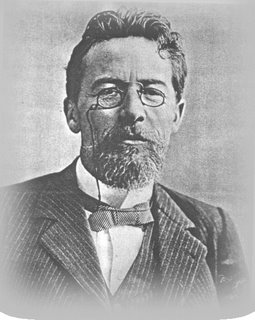
I have been wanting to write on these two things for a while, but
haven’t had either the time or the inclination for some reason. Now it feels a little like the horse has left the barn, but I’ll see what comes up.
A few weekends ago, maybe a month now, I had an extremely Russian experience watching both the movie of Dr. Zhivago and seeing a production of the Cherry Orchard in the same weekend. Interesting to me because one presages the events of the other, but both have certain things in common. I will say out the outset that I have a prejudice for Chekhov, so let’s get that out of the way. But then again, who wouldn’t? Like I said, don’t really know what I’m going to say here, but I’ll go ahead and jump in.
Doctor Zhivago. Everyone talks about the love story, but it’s a fascinating movie in that the love story doesn’t click in until half way through the movie. Until then, we are seeing revolution, and how those personal relationships effect out hero, Yurii Zhivago.
Quick summation: it is near the revolution. Zhivago is a well-off
medical student who is engaged to Tonya (a very young Geraldine Chaplin in her first movie role). He crosses paths at a restaurant with Laura, who has come to shoot a callous man (played by Rod Steiger) who is having an affair with both her and her mother. She misses and shoots his hand. Laura leaves and marries a revolutionary (Tom Courtenay) who will later become an inflexible revolutionary leader of the party. He leaves her, Zhivago is pulled off to help in the revolutionary effort, though not a political man, and has to leave his wife and her family.
Laura is the nurse who he serves with. When he returns there are
several families living in the huge family house, and the family
flees. Of course, they flee to a town near where Laura lives. He
initiates an affair, she becomes pregnant; he is pulled off to the war again, and on and on.
Aside from the love story, the historical preservation of the
hairstyles of 1965 and the ingratiating Laura’s theme, what this movie does well for me is explore the mindset of the revolution--the people who Zhivago comes back to, who have a little power for the first time in their lives, and the suspicion with which they view anyone who may have more than they do; the machinations of a system set up to protect itself and the few who create it by using the rhetoric of freedom; the peasant mentality. This last for me is the most interesting—as it is said that the Jews had to wander around in the desert for forty years so that anyone who remembered slavery died before entrance to the promise land, the Russian revolutionaries change their slavish allegiance from a Tsar to a despotic regime. And it’s that sheep mentality that fascinates me—perhaps, drawing a universal here, man is not so much looking for freedom as for someone to tell him what to do. I’m not sure I’m in that camp, but it’s fascinating how people will kill, starve, and torture for an idea if the idea is strong enough.
Do people want to live for an idea larger than themselves (I wouldn’t say selfless, because I don’t think it’s that, they just aren’t always the most selective in how they do it)? I find myself coming back to a conversation I had with a woman in the backseat of a car on the way to Salzburg from Vienna. She was from the Midwest and actually said “I don’t understand these people—if they were coming to take my freedom I would just take my children and leave.” I have a feeling though, if the idea was big enough, say terrorist strikes in the United States, she would be first in line to give them up. There’s not always a warning.
Not really sure where this is headed now, but interesting for me in the film was the transformation of the people at large. And the conscious choice to have Zhivago watch the entire thing passively. And the hairstyles. Ha ha. Actually, the DVD had some great extras—and a great making of featurette—who knew it was done in Spain, and that the house of ice was made of wax? That Pasternak actually had an affair with a woman later in life and modeled the book on his life? Most interesting was a Geraldine Chaplin story about the scene where the protestors in the street sing the Communist anthem. As this was Spain under Franco, people actually heard the singing and thought the revolution had come again. They were happy; the police weren’t. They watched the rest of the filming. Ideas are powerful.
Speaking of, one of the most powerful performances I have seen in a while was given by Alfred Molina recently in a production of The Cherry Orchard at the Ahmanson here in LA. I love this play. Molina played Lopakhin, the serf-cum-businessman who ends up buying the Orchard where his father and grandfather were slaves. I love this play—I’ll say it again. Nothing I can say will convey how much, but I’ll go ahead and try. If Zhivago is about larger idea and the play of history in individual lives, The Cherry Orchard is about the little decisions we make, who we are, and how these things conspire to shape our lives. I’ll just abbreviate now—ILTP.
Bit of a short synopsis for those of you not familiar with it: Everyone in the household is excited that Ranevskaya (played by Annette Bening) is returning after being in Paris with her lover. She is awaited by Dunyasha (Jennifer Dundas), a servant who thinks she is delicate like a lady; Lopakhin (Molina), a friend of the family who grew up as a serf there but is now a successful businessman; Gayev (Lothaire Bluteau—best known for Jesus of Montreal-in kind of an odd casting choice); Firs, ancient butler/valet to Gayev; and Varya, the mistress of the house and Ranevskaya’s daughter/foundling. Ranevskaya returns with her daughter Anya and her valet, Yasha, to her beloved house and Orchard, penniless. Lopakhin explains how she must sell the Orchard to let out for summer houses or she will lose it. She says she doesn’t understand what he’s saying. Simeonov-Pischik, a neighbor, comes and ask to borrow money from her. She gives it to him. Petya Trofimov, her drowned 7 year-old son’s fromer tutor, is staying at the house as well. The moment of the auction comes closer as Ranevskaya and Gayev still have no way to pay the mortgage. Yasha flirts with Dunyasha, but really wants to go back to Paris. Lopakhin tries to convince Ranevskaya to convert the land. She says she has no money, but gives coins to a passing beggar. Varya berates her. She agrees no more, and then asks to borrow money from a friend. Anya and Trofimov have a romantic/revolutionary moment, as he talks about politics constantly, though still seems to have a little crush on Ranevskaya. The third act is a party, where Ranevskaya talk about how low they have come that they’re inviting the postman and it used to be nobles. Simeonov-Pischik comes in and borrows more money. Varya throws her keys angrily as she protests that she has no money to feed the servants and her mother is loaning others money. She agrees. Everyone is waiting for Lopakhin, Varya and Gayev to returnfrom the auction, as there has been a little money from a rich Aunt. Lopakhin comes in and tells everyone how he has bought the orchard.
Molina doing Lopakhin’s speech is stunning—I even asked a friend if I could see the text of the adaptation, as it felt fuller to me than any other time I had seen it or read it. When he sent it to me, the text was similar to the Lopakhin speech I remembered. It wasn’t the text, it was Molina’s performance. Anger, elation, frustration, rage, compassion, helplessness, ecstasy—I could go on, all of this contained in this small two paragraph speech recounting winning the auction and buying the house where his forefathers were slaves. The elation mixed with the triumphant rage at his father and grandfather having ever been slaves, and his exhortation to Ranesvskaya as she weeps—“Why didn’t you listen to me?” is chilling, and beyond real. Even in the midst of elation, we see what mixed feelings Lopakhin has in taking away something from a friend, but having had to do it before someone else did. And his frustration at her carelessness--and truly how much he loves this woman as well. I like Annette Bening, but she didn't register with me as much as he did. I wanted her to haunt the play as she does with everyone in it, but she didn't quite get there for me.
Of course, the most thrilling scene in the play for me is when Lopakhin is left alone with Varya, specifically to propose to her, and he speaks of nothing, then leaves the room when called. One reviewer noted how whenever marriage to Varya is mentioned in the play, he takes a step backward. You don’t even notice--it's not a huge gesture, but you feel his reluctance. In this production there is a silence after the conversation about nothing, and he steps toward her for the first time, as if to ask a question, and a voice calls him out of the room at that exact moment. Heart-breaking. Varya breaks down, composes herself. Everyone leaves. And Firs, the old butler who lives only to serve Gayev, is left alone in a locked house he can’t escape from. The End. And I haven’t even mentioned the wonderfully comic Yephikodov, the clutz with the squeaky shoes, or Carlotta, the ventriloquist nanny who eats whole cucumbers.
I know there’s a lot to write about this play, critically, but I just have to say ILTP and leave it at that. So a whole lot of plot summary. I liked the production, for the most part. What I most love about theatre is what this play does for me (When it's done well). There is a blank space. It is filled with life; it moves you, challenges you, touches you, and then the stage is empty. And you’re left a little changed, feeling fuller, happier, and slightly melancholy—you see the stage now as a place where something happened, someplace you were completely taken out of yourself, and you miss it a bit now that it’s gone. And it will stay with you for a while. The best theatre does that for me. It’s exhilarating.
Subscribe to:
Comments (Atom)
